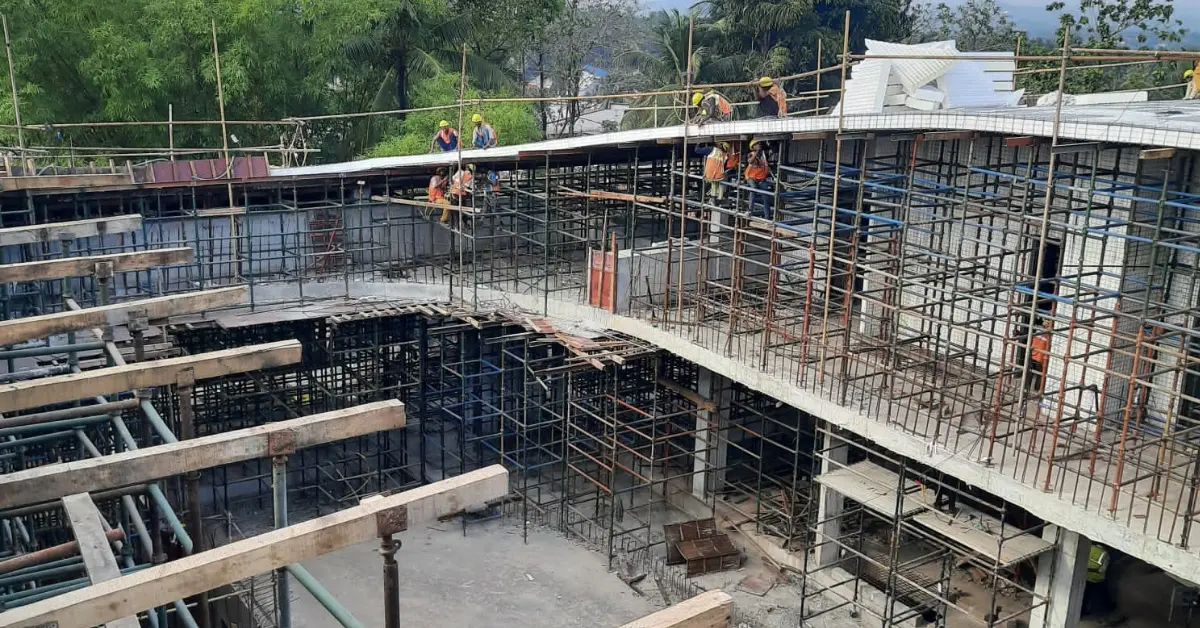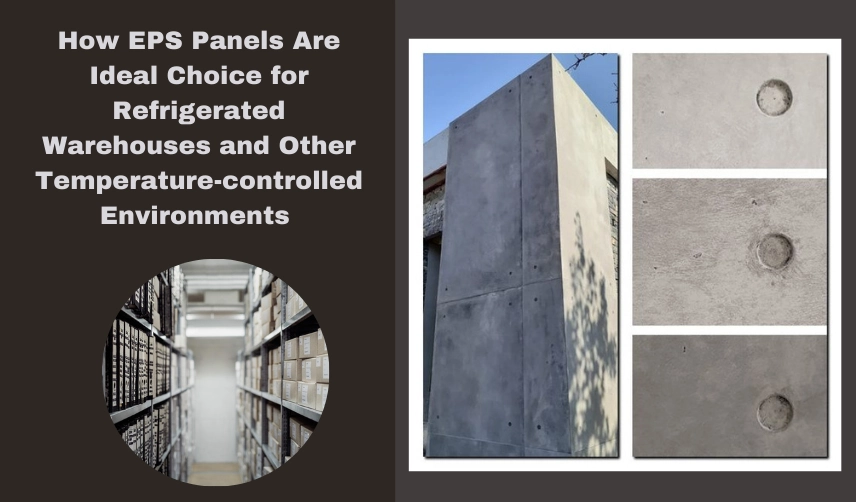In temperature-controlled environments, such as refrigerated warehouses, the selection of construction materials plays a pivotal role in ensuring efficiency, sustainability, and cost-effectiveness. One such material that has gained significant prominence is Expanded Polystyrene (EPS) panels. These panels offer a unique blend of thermal insulation, structural integrity, and versatility, making them an ideal choice for various applications within temperature-controlled settings. In this blog post, we will explore the many advantages of EPS panels and why they are becoming the go-to solution for refrigerated warehouses and other environments requiring stringent temperature control.
Table of Contents
ToggleWhat are EPS Panels?
Expanded Polystyrene (EPS) panels are a type of rigid, closed-cell foam insulation made from polystyrene beads. These beads are expanded and fused together to form large blocks, which are then cut into panels of varying thickness and dimensions. EPS panels are lightweight yet sturdy, providing excellent thermal insulation properties due to their low thermal conductivity.
Thermal Insulation Efficiency
Superior Insulation Properties
One of the primary reasons EPS panels are favored in temperature-controlled environments is their outstanding thermal insulation efficiency. The closed-cell structure of EPS reduces the transfer of heat, maintaining stable internal temperatures even in extreme external conditions. This is crucial for refrigerated warehouses, where temperature consistency is vital for preserving perishable goods.
Energy Savings
The superior insulation properties of EPS panels lead to significant energy savings. By minimizing heat transfer, these panels reduce the load on cooling systems, which in turn lowers energy consumption and operational costs. For businesses operating refrigerated warehouses, this can translate to substantial cost savings over time, making EPS panels a financially sound investment.
Structural Benefits
Lightweight and Strong
Despite their light weight, EPS panels are incredibly strong and durable. This makes them easy to handle and install, reducing construction time and labor costs. The strength-to-weight ratio of EPS panels ensures that they can support significant loads without compromising the structural integrity of the building.
Versatility in Design
EPS panels offer flexibility in design, allowing architects and builders to create customized solutions tailored to specific requirements. They can be cut into various shapes and sizes, facilitating innovative designs for refrigerated warehouses and other temperature-controlled environments. This adaptability ensures that EPS panels can meet the unique needs of different projects.
Moisture Resistance
Prevention of Condensation
In refrigerated environments, controlling moisture is as important as maintaining temperature. EPS panels are inherently resistant to moisture absorption, which helps prevent condensation within the insulated structure. This characteristic is essential for maintaining hygiene and preventing mold growth, which can be detrimental to stored products.
Long-term Durability
The moisture resistance of EPS panels contributes to their long-term durability. Unlike other insulation materials that may degrade or lose effectiveness when exposed to moisture, EPS maintains its insulation properties over time. This ensures a long-lasting solution for temperature-controlled environments, reducing the need for frequent repairs or replacements.
Cost-effectiveness
Affordable Material
EPS panels are generally more affordable compared to other high-performance insulation materials. Their cost-effectiveness, combined with their energy-saving properties, makes them an attractive option for businesses looking to optimize their expenditure on building materials.

Reduced Construction Time and Labor Costs
The lightweight nature and ease of installation of EPS panels contribute to faster construction times and lower labor costs. This is particularly beneficial in large-scale projects, such as constructing refrigerated warehouses, where time and budget efficiency are critical.
Environmental Benefits
Energy Efficiency and Reduced Carbon Footprint
By enhancing the energy efficiency of temperature-controlled environments, EPS panels help reduce the overall carbon footprint of the facility. Lower energy consumption means fewer greenhouse gas emissions, contributing to a more sustainable operation.
Recyclability
EPS panels are recyclable, making them an environmentally friendly choice. At the end of their life cycle, EPS panels can be reprocessed and reused in the production of new panels or other products, minimizing waste and supporting circular economy principles.
Applications Beyond Refrigerated Warehouses
Food Processing Facilities
In addition to refrigerated warehouses, EPS panels are widely used in
food processing facilities where maintaining specific temperatures is crucial. Their insulation properties ensure that processing areas remain at optimal conditions, safeguarding the quality and safety of food products.
Cold Storage Units
Cold storage units for pharmaceutical products also benefit from the use of EPS panels. The precise temperature control required for storing medicines and vaccines is facilitated by the reliable insulation provided by EPS, ensuring that these sensitive products remain effective.
Agricultural Buildings
Agricultural buildings, such as controlled-environment agriculture (CEA) facilities, use EPS panels to maintain stable temperatures and humidity levels. This is essential for the growth and preservation of plants and produce, leading to higher yields and better quality products.
Conclusion
EPS panels have proven to be an ideal choice for refrigerated warehouses and other temperature-controlled environments due to their exceptional thermal insulation, structural benefits, moisture resistance, cost-effectiveness, and environmental advantages. Their ability to maintain stable temperatures efficiently and reliably makes them a preferred material in various industries that require precise temperature control. As businesses continue to seek sustainable and economical solutions, EPS panels are likely to play an increasingly important role in the construction and operation of temperature-controlled facilities.
Incorporating EPS panels into your temperature-controlled projects not only ensures optimal performance but also contributes to long-term cost savings and environmental sustainability. Whether you are constructing a new refrigerated warehouse, upgrading an existing facility, or planning any temperature-controlled environment, EPS panels offer a proven solution that meets the demands of modern industry standards.
Also, read
The Benefits Of EPS Wall Panels For Energy Reduction
FAQs
1. How do EPS panels compare to other insulation materials in terms of thermal performance?
EPS panels offer superior thermal insulation due to their closed-cell structure, which significantly reduces heat transfer. This makes them more efficient compared to many other insulation materials, such as fiberglass or mineral wool. The high R-value per inch of EPS panels ensures that they provide excellent temperature control, making them ideal for refrigerated warehouses and other temperature-sensitive environments. Additionally, EPS panels maintain their insulation properties over time, even when exposed to moisture, unlike some other materials that may degrade or lose effectiveness.
2. Are EPS panels environmentally friendly?
Yes, EPS panels are environmentally friendly in several ways. First, they enhance the energy efficiency of buildings by providing superior insulation, which reduces the energy required for heating and cooling. This leads to lower greenhouse gas emissions and a smaller carbon footprint. Second, EPS panels are recyclable. At the end of their life cycle, they can be reprocessed and reused in the production of new panels or other products, supporting waste reduction and circular economy principles. Moreover, the energy savings associated with using EPS panels contribute to a more sustainable operation over the long term.
3. What are the benefits of using EPS panels in refrigerated warehouses specifically?
EPS panels are particularly beneficial for refrigerated warehouses for several reasons:
Thermal Insulation: They provide exceptional thermal insulation, ensuring that internal temperatures remain stable despite external temperature fluctuations. This is crucial for preserving perishable goods.
Energy Efficiency: By reducing heat transfer, EPS panels lower the demand on cooling systems, resulting in significant energy savings and reduced operational costs.
Moisture Resistance: Their resistance to moisture absorption prevents condensation, which is important for maintaining hygiene and preventing mold growth.
Durability and Longevity: EPS panels retain their insulation properties over time, even in moist conditions, offering a long-lasting solution that requires minimal maintenance.
Cost-Effectiveness: They are more affordable than many other high-performance insulation materials, and their ease of installation reduces construction time and labor costs, making them a cost-effective choice for large-scale refrigerated storage facilities.



